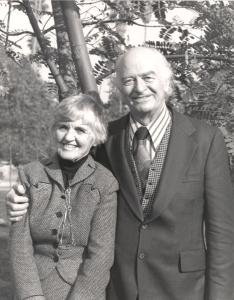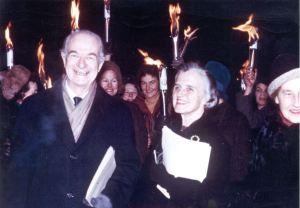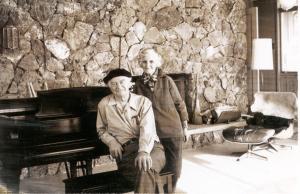
The Paulings, 1976.
Creative nonfiction by Melinda Gormley and Melissae Fellet
Big Sur, 1976-1977
Linus and Ava Helen Pauling are in the kitchen of their home on the Pacific Ocean in Big Sur, California. A film crew follows their activities. Ava Helen ladles soup from a large pot on the stove and puts the bowl onto Linus’s plate. Ever careful and meticulous, Linus adjusts the bowl, squaring up its handles so they point directly to his right and left.
Linus Pauling is considered one of the most influential and controversial scientists of the 20th century. Even before becoming the sole winner of two unshared Nobel Prizes – one in chemistry and the other Peace – he was a public and political figure agreeing to interviews, debates, tapings, and photographs.
Pauling had little interest in politics until he met Ava Helen. Growing up in a politically active family, she was familiar with debates around the dinner table. She followed her humanitarian values into activism for civil rights, women’s rights, and peace. In early 1940, she joined the American Civil Liberties Union, working to raise awareness about the internment of Japanese Americans.
She inspired Linus’s entrance into the peace movement. After one of his public lectures in the mid-1940s, Ava Helen voiced a concern to her husband. “I think that you should stop giving lectures about atomic bombs, war, and peace. When you talk about a scientific subject you speak very effectively and convincingly. It is evident that you are a master of the subject that you are talking about. But when you talk about the nature of war and the need for peace, you are not convincing, because you give the audience the impression that you are not sure about what you are saying and that you are relying on other authorities.”
What shall I do? Pauling wondered. I want to earn and keep Ava Helen’s respect. I don’t want her to think I am a coward. And, I have my own self-respect to consider. I won’t be cowed by Communist witch hunts. When other scientists pulled back, Linus didn’t. He attributed his perseverance to his wife. He did it to retain her respect.
“Of course it’s important that you do your scientific work. But if the world were destroyed then that work would not be of any value,” Ava Helen continued, feeling a little guilty. He gets great and deep pleasure from his scientific work, she thought to herself, and he’s so competent and enthusiastic in it. But he must realize that there is a need for people to know and understand the different means of waging war.

Torchlight procession in Oslo, December 1963.
Ava Helen’s remarks changed the course of Linus’s life. He learned about international relations, international law and the peace movement. He began speaking about the dangers of atomic weapons always keeping his presentations up-to-date with the latest scientific advances and political developments. Linus, who tended to make sense of things through calculations, estimated that he spent half of his time on scientific questions and half on political activism during the 1950s.
Linus and Ava Helen also worked together on many specific political efforts. In 1957, she helped him distribute a petition that gathered 9,000 signatures from scientists worldwide. It was the largest organized political movement among scientists in a decade. Together, they delivered the petition to the United Nations.
During the 1950s and 1960s, she worked with Linus on peace and nuclear disarmament. She accompanied him to peace conferences around the world. Ava Helen also continued her own public life, organizing protests and speaking to women’s groups about peace and ending weapons tests.
Often Linus and Ava Helen faced harsh criticism for their efforts. Pauling’s scientific career suffered as a result of his activism. In 1952 the U.S. State Department denied him a passport and the next year he received notice that his large U.S. Public Health Service grant would not be renewed. Undaunted, they both continued their activism, following their shared humanitarian convictions, despite the consequences from their perceived political misbehavior.

The Paulings, 1977.
The filmmakers are creating Linus Pauling: Crusading Scientist, a 1977 documentary that describes Pauling’s scientific achievements and political activism.
The interviewer turns his attention to Ava Helen asking, “Is he hard to live with?”
She wears large, round, dark rimmed glasses with lightly tinted lenses. Her short hair is gray and white. She looks from the interviewer to her husband before responding.
“Yes, he is.” She nods and gazes at Pauling.
Pauling looks at her. “What?” he chuckles.
Ava Helen is laughing and smiling, too, still gazing at her husband who sits between her and the camera.
There’s a long pause. Pauling turns back to his wife, who is wearing a loose sea green turtleneck under a colorful, earth-toned poncho.
Ava Helen looks at her husband and says, matter-of-factly, “I said yes he is.” She smiles at him. The love and admiration they have for one another is evident, even after 55 years of marriage.
“Hard to live with?” Pauling feigns disbelief, turning from his wife to the interviewer. “I thought I was just about the easiest-going person that there was in the world.” He crinkles his nose, squints his eyes, and lifts his shoulders while looking at the camera. It’s his silent way to say, perhaps I exaggerate. He leans down to his bowl of soup and sups two spoonfuls.
“That could be true, too, but still be hard to live with.” She tells him while she watches him eat.
He wipes his mouth with a napkin and responds in a more serious voice. “In a sense I think you are hard to live with.” He leans forward and looks at her before sitting upright and focusing on the cameraman again. “Your principles are so high. Your standards are so high that I have to behave myself all the time,” he says with mock exasperation while playfully rolling his eyes.
Ava Helen laughs. “And that’s a great burden, I’m sure. Well now, you tell me the next time you want to misbehave.”
“O. K.” Pauling laughs tossing his head back slightly and wearing a big grin. “It will be with you though.”
